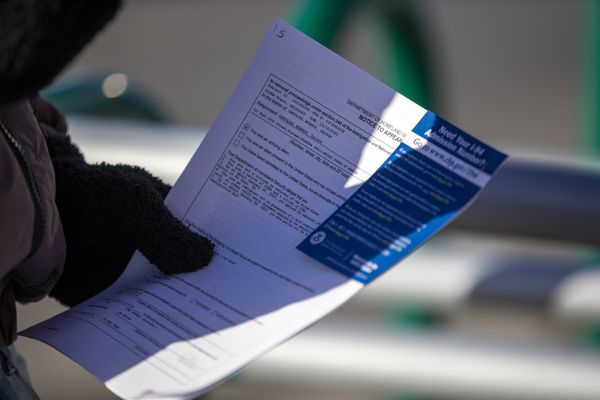
UPDATED: 16 FEB 2022 12:55 PM EST
A man who faces charges for his role in the Jan. 6 insurrection now makes music on Spotify, and his latest release — which included a string of violent references to former President Donald Trump and President Joe Biden — was removed by the music streaming platform Monday, three weeks after its debut.
John Sullivan, who uses the alias “Jayden X” when making music, released the song “America's Final Hour” on Jan. 24. In the vulgarity-laced track, Sullivan rapped about America’s political divide and forcefully rebuked Trump, even claiming to be “trying to end [Trump’s] life.”
The song was removed Monday night after POLITICO requested a comment from Spotify. A spokesperson said the song violated the company's content policies.
“I think America’s suicidal. In fact, I’m a little homicidal myself,” Sullivan raps on the track.
“Fuck you and fuck Trump and fuck all his racist ass supporters,” he continued.
Unlike many of the rioters on Jan. 6 who appear to support Trump or back right-wing organizations, Sullivan is an activist for left-leaning causes. In 2020, he made headlines for his involvement in a number of Black Lives Matter protests that turned violent, including one in Provo, Utah, in which a motorist was shot. Rudy Giuliani and others pointed to Sullivan’s involvement in the Jan. 6 riot to bolster the conspiracy that antifa, not Trump supporters, were behind the attack.
But many left-leaning groups, including the Black Lives Matter organization in Sullivan’s home state, have denounced Sullivan as a “loose cannon” and an “untrustworthy opportunistic liar.” During the summer of 2020, Sullivan bolstered his self-proclaimed “activist-slash-journalist” profile by participating in Black Lives Matter protests across the West, filming on-the-ground footage and posting it on YouTube.
On Jan. 6, Sullivan captured nearly 40 minutes of footage during the Capitol attack, which he subsequently sold to NBC, CNN and other news outlets for over $90,000. Sullivan says he was acting as a journalist, but he had no credentials and was subsequently charged with a bevy of criminal acts, including civil disorder and violent entry. He said that federal authorities confiscated the money he earned from the Capitol footage, which included a video of Ashli Babbitt’s death.
Sullivan first published music to Spotify in September 2021, and his growing musical portfolio includes more than 30 songs, most of which are relationship or Christmas-themed. He said the new song, in which he called himself “homicidal” and suggested violence toward Trump, was not to be taken literally.
“‘End his life’ is hyperbole for ‘you belong to rot in jail with all the other people you plotted and planned the coup attempt with,’” Sullivan said in a phone interview Monday, hours before the song was removed. “So I'm trying to end his life, metaphorically, in terms of his Mar-a-Lago, roaming-free life.”
The other references to violence, Sullivan claimed, were a hyperbolic representation of America’s political climate, in which the country is “falling apart” and Americans are “killing each other in the political arena,” he said.
Sullivan’s song also included a reference to Biden, mocking the president’s stutter and implying that his handling of the Russia-Ukraine conflict could lead to the United States’ demise.
Spokespeople for the White House and Trump did not respond to requests for comment on the song and its removal from Spotify.
On Jan. 30, in the wake of backlash stemming from podcaster Joe Rogan’s Covid-19-related disinformation, Spotify published its platform rules for content creators. The previously private guidelines specifically denounce “dangerous content,” defined in part by “inciting or threatening serious physical harm or acts of violence against a specific target or specific group.”
John Wihbey, an associate professor who leads Northeastern University's Ethics of Content Labeling project, said the Rogan controversy has forced content platforms like Spotify to reconsider how they handle harmful or misleading information.
“Companies that host large amounts of audio content — whether it's podcasts or songs — are going to start to have to think really hard about what they’ll accept on their platforms,” Wihbey said.
Wihbey said large platforms like Spotify do not vet every song or podcast before they are published, due to the volume of content. That could change, he said, as more "flare ups" occur.
"When you become a big, rich company that's in the public eye, you have a greater responsibility and you need to figure out strategies for monitoring what's there, especially where it goes over the line into threats of violence or incitement," Wihbey said.







